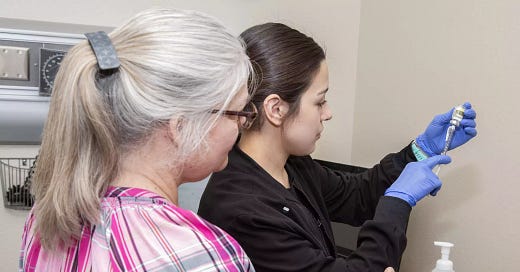TC offers sign-on bonus to nurse educators
Nursing Assistant Professor Ellisha Robinson watches as first-semester student Natalie Gallardo draws a simulated medication during a nursing class. Steve Lemmons | Temple College
DAVID STONE | OUR TOWN TEMPLE
Texas needs more nurses — a lot more. And, they need additional educators to teach and train the nurses of tomorrow.
There were 180 full-time and 116 part-time nurse educator vacancies reported by nursing schools throughout the state in 2021, according to the Texas Center for Nursing Workforce Studies.
Temple College is not immune, and to combat the nursing educator shortage, TC is utilizing funds received from the Nursing Shortage Reduction Program, a grant designed to help with recruitment and retention of Associate Degree in Nursing (ADN) faculty.
According to TC spokesperson Eric Eckert, the money will be used to provide current Temple College nursing faculty with market-adjustment and retention stipends as well as provide sign-on bonuses for new full-time faculty.
Eckert said the College began experiencing a nursing faculty shortage in the fall of 2021 and currently has three open full-time positions in the ADN program and four part-time vacancies for clinical and simulation lab instructors. The drop in the number of full-time faculty imposes limits on the number of students who can be accepted into the renowned program.
“The top-tier quality of a Temple College nursing education is certainly still here, but the quantity of students who we can admit and still maintain that quality is in question,” said Tracey Cooper, Temple College’s Division Director of Health Professions.
“Just like nursing is a calling, nursing education is also a calling,” Cooper said. “Nurses who have the desire to give back to the profession by educating the nurses of the future are needed.”
Cooper said the qualifications needed to teach in the ADN program include completion of a Master of Science in Nursing degree, preferably in education, but that is not required.
“We are able to hire someone while they are completing their MSN if they are within one year of completion,” Cooper said. “Nurses must have current practice experience in the area where they will be teaching.”
The full-time positions currently open Temple College are in Medical-Surgical Nursing and Mental Health. All full-time faculty supervise students in clinical. There are part-time openings for clinical instructors, which require one 12-hour shift a week, along with grading responsibilities.
The Simulation Lab has part-time openings between 10-19.5 hours per week for nurses who have completed their Bachelor of Science in Nursing.
The state’s Department of Health & Human Services projects a shortfall of most nurse types by 2023. The supply of licensed vocational nurses, registered nurses and certified nurse-midwives will fall short of demand, and the supplies of nurse practitioners and certified nurse anesthetists are expected to exceed demand every year through 2023.
The number of LVN’s in Texas is expected to reach 79,179 by 2032 but with growing demand, there will be a shortage of nearly 13,000 nurses. This year, the state actually has more than enough LVN’s to meet demand, but by 2025 the surplus will become a deficit that will more than double by 2032, according to projections.
In 2032, the state is expected to have 40,000 more registered nurses than it does today, but demand is projected to outpace that growth. The RN deficit in 11 years will be 57,012.
Texas Health & Human Services said the largest demand for both LVN’s and RN’s in the future will be in the inpatient hospital setting.
In 2018, there were 20,922 nurse practitioners in Texas. That number is expected to climb 117.3 percent to 45,462 in 2032, leaving a surplus of 19,271, according to the report.
Schools such as Temple College and UMHB are working to help fill the projected nursing vacancies.
“We started expanding our Associate Degree Nursing program in 2017 and had a five-year goal of doubling enrollment in the program,” Cooper said. “We hit that goal a year early and now we’re out of room. The bond that passed (in May 2021) will allow us to continue to grow and help meet health-care needs.”
Cooper said one of the biggest barriers to hiring qualified nursing faculty is supply and demand. The national nursing shortage has driven up nursing salaries.
However, teaching at the college level can provide a number of benefits that nurses who work long nights, weekends and through the holidays might find appealing.
Some of the benefits of a career in nursing education at Temple College include:
Day shifts Monday through Friday
Holidays off with extended time at Christmas
Fall and Spring Breaks off
9-month contracts, which allow nursing faculty to take summer vacations or even pick up extra work during the summer months
State benefits, including paid insurance for the employee
Cooper said Temple College nursing programs are among the best in the state with National Council Licensure Examination pass rates consistently above the state and national levels in both the ADN and Vocational Nursing programs.
“Temple College’s nursing program has long been a standard bearer in the industry,” she said. “To maintain that exceptional reputation, we need to continue to provide the best training possible to our nursing students. We are doing everything that we can to retain our current faculty and to hire new faculty to teach the next generation of nurses.”
Did you like this story?
I hope you are enjoying my offerings this week. I want to express my appreciation to the many readers who have used the “tip jar” button to help support community journalism. Thank you. If you value my work, please show your support:
Brrrrrr!
While Texans are enjoying warm weather and blooming wildflowers, not all Americans are having an early spring. Our Town Temple reader Janice Thompson of Oregon sent in this photo she snapped Tuesday just outside Salem. Janice and her fellow Oregonians are still very much entrenched in winter weather. Hang on, Janice, warmer days are coming.












